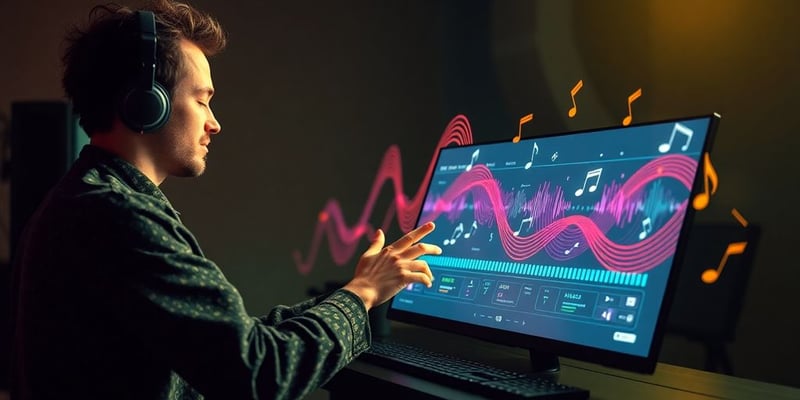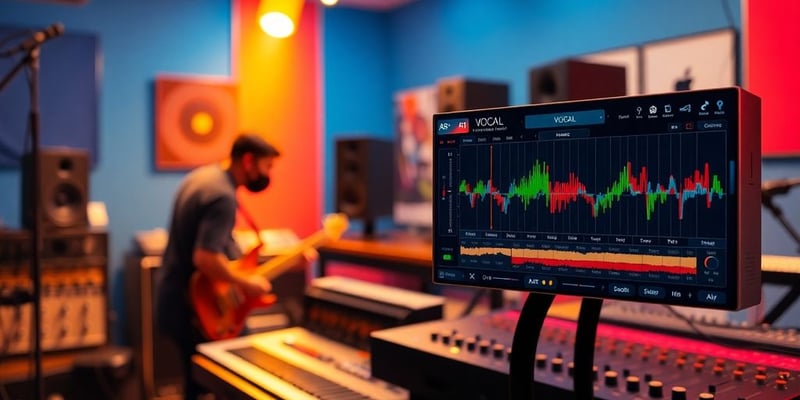
Unlocking Creativity: How AI-Generated Singing is Revolutionizing Music Production in 2025
Save 15%

In 2025, AI-generated singing is turning the music world on its head. It's not just a fancy gadget; it’s reshaping how music is made and heard. Imagine having a singer who never misses a note and can sing in any style or language you want. That's what AI is bringing to the table. It's making music production more creative and accessible for everyone, from big-time producers to indie artists working from their bedrooms.
Key Takeaways
- AI-generated singing is revolutionizing how music is produced and performed.
- Musicians can now experiment with endless vocal styles without needing a human singer.
- AI is making music production cheaper and more accessible.
- There are ongoing debates about the ethics and authenticity of AI-generated music.
- AI vocals are blending with live performances, creating new musical experiences.
The Rise of AI-Generated Singing in Modern Music

Understanding AI Vocal Technology
AI vocal technology is more than just a tech trend—it's reshaping our musical landscape. These systems can mimic human voices so closely that you might not even notice the difference. They use complex algorithms to learn and replicate vocal patterns, making them incredibly versatile. What's really fascinating is how these AI vocalists can sing in various languages and styles, adapting to whatever the music demands. It's like having a multilingual, multi-genre singer at your fingertips.
How AI is Transforming Vocal Performances
AI is giving traditional vocal performances a high-tech makeover. Producers now have the tools to tweak and perfect vocals in ways that were unimaginable before. Imagine a singer hitting every note perfectly, every time—that's the kind of precision AI offers. Plus, AI can experiment with vocal effects that human singers might find challenging, adding layers and depth to performances.
- Seamless pitch correction
- Infinite vocal range possibilities
- Unique vocal effects and harmonies
The Role of AI in Music Innovation
AI isn't just a tool—it's a creative partner. Musicians and producers are using AI to push boundaries and explore new musical landscapes. It's like having a collaborator who's always ready to try something new. AI's role is expected to unite artists on shared technological platforms, fostering cross-pollination that could lead to the emergence of new genres and innovative musical hybrids.
AI vocalists are not just about replacing human voices; they're about expanding the horizons of what's possible in music. They offer a new palette of sounds and possibilities, helping artists to dream bigger and bolder.
For those interested in the cutting-edge of AI-generated music, explore the best AI-generated songs featuring high-energy collaborations with the SOUNDRAW AI music generator.
AI-Driven Creativity in Songwriting and Production
Enhancing Music Production with AI Vocals
AI vocals are like having a versatile singer on standby. You can experiment with different styles without needing a human singer for each track. This flexibility opens up a world of creative possibilities. Imagine trying a pop vibe, then switching to something classical—all in the same session. AI vocals can match the emotional tone of your music, making it easier to create a cohesive sound. AI vocals bring a new layer to music production, offering creative freedom and experimentation.
The Impact of AI on Music Genres
AI is shaking up music genres in ways we couldn't have imagined. By analyzing tons of data, AI blends elements from rock, jazz, hip-hop, and more, creating unique sounds. This genre-mixing opens new avenues for artists to explore, leading to fresh, innovative music styles. It's exciting to think about what might come next as AI continues to push the boundaries of what's possible in music.
Exploring the Benefits of AI Vocalists for Artists and Producers
AI vocalists are not just about cutting costs or saving time. They're about expanding horizons and exploring new musical landscapes that were previously out of reach. As technology continues to evolve, the potential for AI in music production will only grow, offering artists and producers exciting new tools to express their creativity. AI vocalists can:
- Suggest lyrics, melodies, and harmonies.
- Analyze trends and suggest ideas that fit current musical tastes.
- Allow for genre-blending, creating unique and innovative sounds.
AI vocalists are here to stay, making waves in the music industry. Whether you're an artist looking to innovate or a producer seeking efficiency, AI offers something for everyone. The future of music production is bright with AI vocalists leading the charge.
The Technology Behind AI-Generated Singing
Machine Learning in Vocal Synthesis
Machine learning is at the heart of AI-generated singing. It enables computers to replicate human voices by analyzing large volumes of data. These systems learn from endless hours of recorded speech and singing, identifying patterns and nuances that make each voice unique. With this tech, AI can craft vocals that sound incredibly human. It's not just about hitting the right notes; it's about capturing the emotion and style unique to each performance.
The Role of Neural Networks in AI Vocals
Neural networks are like the brain behind AI vocals. They process information in layers, each refining the output a bit more. This tech allows AI to adapt and improve over time, getting better at mimicking human vocal traits. Neural networks can handle complex tasks like pitch modulation and dynamic expression, making AI vocals more realistic and engaging.
Advancements in AI Audio Processing
AI audio processing has come a long way. Today, AI can streamline music production by aligning vocals, tuning recorded takes, and even recreating the sound of famous singers. This evolution allows musicians and producers to experiment with new sounds and techniques without the constraints of traditional vocal recording. AI audio tools are constantly updated, offering more precision and creativity in the studio.
AI-generated vocals are not just about cutting costs or saving time. They're about expanding horizons and exploring new musical landscapes that were previously out of reach. As technology continues to evolve, the potential for AI in music production will only grow, offering artists and producers exciting new tools to express their creativity.
For more insights on AI music generators and their role in music production, explore how machine learning algorithms are transforming the industry.
The Future of AI Vocal Plugins in Music
Predictions for AI in Music by 2030
Looking towards 2030, AI vocal plugins are expected to become a staple in music production. These tools will likely evolve to produce vocals that are indistinguishable from human voices. Imagine virtual singers performing alongside human artists, creating unique collaborations that push musical boundaries. AI could also be a game-changer in music education, offering instant feedback to budding musicians.
Emerging Trends in AI Vocal Technology
Several exciting trends are emerging in AI vocal technology:
- Vocal Synthesis: AI is now capable of mimicking the voices of famous singers, opening up new creative possibilities.
- Streamlined Production: AI tools make music production faster and more accessible, especially for independent artists.
- Live Performance Integration: AI vocals are being integrated into live shows, adding a new dimension to concerts.
The Ongoing Debate: AI vs. Human Talent
There's a lively debate about AI's role in music. Some worry about losing the human touch, while others see AI as an enhancer of creativity. It's about finding a balance where AI supports human artistry without overshadowing it. As technology advances, this conversation will only become more important.
AI vocal plugins are reshaping the music industry, offering new ways to create and experience music. As these tools evolve, they promise to make music more innovative and accessible, but the challenge will be to maintain the soul and emotion that define human artistry.
By 2025, the library of AI voices is expected to expand significantly, providing tools for creating unique textures and exploring innovative concepts in music production.
Balancing Creativity and Technology in AI-Generated Singing
Addressing Ethical and Copyright Concerns
As AI vocal plugins become more prevalent, copyright and ethical issues are at the forefront of discussions. Musicians and producers often grapple with questions about ownership and originality. Who owns the rights to a track created with AI vocals? This question is still being debated, especially when AI-generated content might mimic existing artists. It's crucial to establish clear guidelines and legal frameworks to avoid disputes.
Balancing Human and AI Creativity
AI can do a lot, but it's important not to lose the human touch. While AI can generate melodies and lyrics, the emotional depth and unique perspective of a human artist are irreplaceable. Musicians need to find a balance between leveraging AI's capabilities and maintaining their creative voice. This balance ensures that AI acts as a tool rather than a replacement, complementing human creativity rather than overshadowing it.
Ensuring Authenticity in AI-Generated Music
Authenticity is a big deal in music. Fans want to connect with artists on a personal level, and AI vocals can sometimes feel impersonal. To keep that connection alive, artists should focus on integrating AI in a way that enhances their personal style rather than diluting it. This might mean using AI to experiment with new sounds while still staying true to their artistic identity.
As AI vocal plugins continue to evolve, the music industry must adapt, finding ways to incorporate new technology without losing the essence of what makes music personal and relatable.
Embracing the AI Revolution in Music
The New Composer’s Assistant
AI is reshaping how music is made. It's not just a tool anymore; it's like a partner in the studio. Musicians are using AI to help with everything from writing songs to producing tracks. It's like having a super-smart assistant who can suggest melodies or even create entire compositions. This tech isn't about replacing artists but giving them more ways to create.
Democratization of Music Production
One of the coolest things about AI in music is how it's making production more accessible. Back in the day, you needed a fancy studio and expensive gear. Now, with AI tools, anyone can make music. Whether you're a pro or just starting, these tools let you create high-quality tracks without breaking the bank. It's like opening the doors of the music world to everyone.
How AI Vocals Are Changing the Music Industry
AI is even changing how we think about singing. AI-generated vocals can mimic human voices or create entirely new ones. This is shaking up the industry, offering new possibilities for artists who want unique sounds. It's also helping in music marketing by automating tasks like scheduling posts and generating content. The future of music is here, and it's powered by AI.
The Evolution of AI Vocal Plugins in Music Production

From Concept to Reality: The Journey of AI Vocals
Once upon a time, the idea of a machine singing like a human was pure sci-fi. Fast forward to today, and AI vocal plugins are a vital part of music production. They’ve gone from a wild concept to a real tool in studios worldwide. Thanks to machine learning and neural networks, these plugins now mimic human voices with jaw-dropping accuracy. It's not just about hitting the right notes; they capture the emotion and style that make a performance stand out. This tech leap has opened up new creative paths for artists and producers alike.
Key Innovations in AI Vocal Technology
Several breakthroughs have pushed AI vocal tech to the forefront. Machine learning algorithms have taught AI to learn from massive vocal datasets, allowing it to mimic a wide range of vocal styles and nuances. Neural networks are key players here, refining these outputs to make AI vocals more realistic and expressive. These tech advancements mean AI can handle complex tasks like pitch modulation and dynamic expression—stuff we thought only humans could do.
How AI Vocals Are Changing the Music Industry
AI vocals are shaking up the music world big time. They’re not just about copying human voices; they’re about pushing the boundaries of what’s possible in music production. With AI vocals, producers can play around with sounds and styles that were tough or even impossible to achieve before. They offer a new palette of sounds, helping artists explore new genres and musical mash-ups. Plus, AI vocals can sing in multiple languages and styles, offering versatility that human singers might struggle with. This tech is changing how music gets made, recorded, and performed, making it more accessible and innovative than ever before.
AI isn't here to replace your creativity—it's here to expand it. With AI vocal plugins, you're not just making music; you're exploring new possibilities, finding inspiration in places you never thought to look. Embrace the collaboration and see where it takes you.
Conclusion
So, here we are in 2025, and AI-generated singing is really shaking up the music scene. It's not just a cool tech trick anymore; it's a game-changer. Musicians and producers are finding new ways to create and experiment without the usual limits. AI is like having a creative buddy who's always ready to jam, no matter the time or place. Sure, there are still some questions about copyright and authenticity, but the potential is huge. With AI, the future of music looks pretty exciting, and who knows what amazing sounds we'll hear next. It's a wild ride, and we're just getting started.
Frequently Asked Questions
What is AI-generated singing?
AI-generated singing involves using artificial intelligence to create vocal performances. These systems can mimic human voices by learning from real singers and can perform in various styles and languages.
How does AI help in music production?
AI assists music production by providing tools for vocal synthesis, pitch correction, and creating harmonies. It allows producers to experiment with different vocal styles without needing a human singer for each version.
Can AI replace human singers?
While AI can mimic human voices and offer new creative possibilities, it's not about replacing human singers. AI is a tool that expands creative options and complements human talent, rather than replacing it.
What are the benefits of using AI vocals?
AI vocals offer cost-effective solutions for music production, allowing artists to experiment with new styles and genres. They provide flexibility and can help overcome creative blocks.
Are there any ethical concerns with AI-generated music?
Yes, there are ethical and copyright concerns with AI-generated music. Questions about ownership and originality arise, especially when AI mimics existing artists. Clear guidelines are needed to address these issues.
What does the future hold for AI in music?
The future of AI in music is promising, with advancements expected to make AI vocals even more realistic. AI is likely to become a staple in music education and production, offering new tools for creativity and collaboration.









